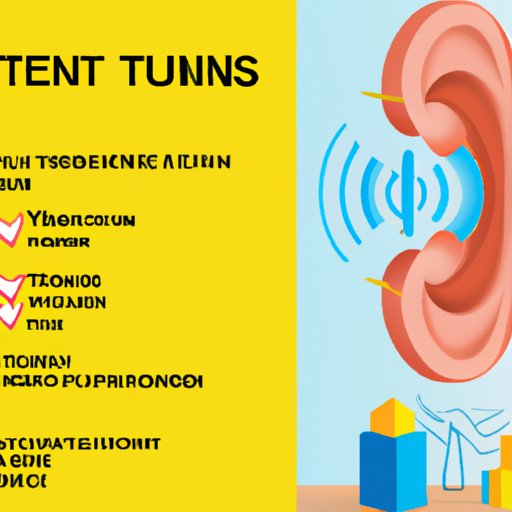Introduction
Do you hear a constant ringing, buzzing, or humming in your ears even when there is no external sound present? This phenomenon, known as tinnitus, affects millions of people around the world. It can be a temporary sensation or a chronic condition that persists for years. It can also range from barely noticeable to severely debilitating. Understanding the difference between tinnitus and imagination can help you determine if you have the condition and what steps to take if you do.

Exploring the Difference Between Tinnitus and Imagination: What to Look For
Tinnitus is a real medical condition that is caused by changes in the auditory system. It can manifest as a variety of sounds, including ringing, buzzing, humming, hissing, whooshing, clicking, and even music. Imagined sounds, on the other hand, are created by the mind and don’t have any physical basis. These sounds may seem real but are not related to any physical process.
Distinguishing between real and imagined sounds can be difficult, especially if you’re experiencing anxiety or stress. However, there are a few key differences that can help you differentiate between the two. Real tinnitus is typically described as a continuous sound, while imagined sounds tend to come and go. Additionally, real tinnitus is often accompanied by other symptoms, such as hearing loss or sensitivity to loud noises. Imagined sounds, on the other hand, often occur in isolation.

Diagnosing Tinnitus: Signs and Symptoms to Watch Out For
If you think you may have tinnitus, it’s important to seek medical attention. A doctor can evaluate your symptoms and rule out other conditions that may be causing them. Common signs and symptoms of tinnitus include:
- Ringing, buzzing, humming, or other noises in one or both ears
- Hearing loss or difficulty understanding speech
- Sensitivity to loud noises or certain pitches of sound
- Headache or fullness in the ear
If you experience any of these symptoms, it’s important to seek medical attention as soon as possible. Your doctor will perform tests to diagnose tinnitus and rule out other potential causes.

Causes of Tinnitus: What You Should Know
The exact cause of tinnitus is not fully understood, but it is believed to be linked to changes in the auditory system. Potential causes of tinnitus include:
- Exposure to loud noise: Long-term exposure to loud noises, such as concerts or construction sites, can damage the delicate structures of the inner ear and lead to tinnitus.
- Age-related hearing loss: As we age, our hearing naturally begins to decline. This can lead to tinnitus in some cases.
- Earwax buildup: Excess earwax can block the ear canal and lead to tinnitus.
- Certain medications: Some medications, such as aspirin and certain antibiotics, can cause tinnitus as a side effect.
- Head or neck injuries: Traumatic injuries to the head or neck can damage the auditory system and cause tinnitus.
Additionally, certain risk factors can increase your chances of developing tinnitus. These include smoking, excessive alcohol consumption, and diabetes.
Treating Tinnitus: Options for Relief
There is no cure for tinnitus, but there are treatments that can help manage the symptoms. Common treatments for tinnitus include:
- Medications: Certain medications, such as antidepressants and anti-anxiety medications, can help reduce the perception of tinnitus.
- Devices: Hearing aids, sound generators, and masking devices can help reduce the perception of tinnitus.
- Alternative and complementary treatments: Acupuncture, hypnosis, and biofeedback can help reduce the intensity of tinnitus.
If you think you may have tinnitus, it’s important to speak with your doctor about your symptoms and treatment options.
Coping with Tinnitus: Strategies for Managing Symptoms
In addition to medical treatments, there are several strategies you can use to cope with tinnitus. These include:
- Managing stress and anxiety: Stress and anxiety can worsen tinnitus symptoms, so it’s important to find ways to reduce your stress levels. Regular exercise, meditation, and yoga can all help.
- Practicing relaxation techniques: Relaxation techniques, such as deep breathing and progressive muscle relaxation, can help reduce the intensity of tinnitus.
- Other coping strategies: Cognitive-behavioral therapy, listening to calming music, and avoiding caffeine and alcohol can all help you cope with tinnitus.
It’s also important to stay positive and remember that tinnitus is a manageable condition. “It’s important to keep in mind that tinnitus is a symptom, not a disease,” says Dr. Deborah Gordon, an audiologist in Massachusetts. “Although there is no cure for tinnitus, many people are able to manage their symptoms and live full, active lives.”
Conclusion
Tinnitus is a real medical condition that is caused by changes in the auditory system. It can manifest as a variety of sounds, including ringing, buzzing, humming, hissing, whooshing, clicking, and even music. Distinguishing between real and imagined sounds can be difficult, but there are a few key differences that can help you differentiate between the two. Common signs and symptoms of tinnitus include ringing, buzzing, humming, hearing loss, and sensitivity to loud noises. Potential causes of tinnitus include exposure to loud noise, age-related hearing loss, earwax buildup, certain medications, and head or neck injuries. Treatment options for tinnitus include medications, devices, and alternative and complementary treatments. Additionally, there are several strategies you can use to cope with tinnitus, such as managing stress and anxiety, practicing relaxation techniques, and cognitive-behavioral therapy.
Tinnitus can be a difficult condition to live with, but it is manageable. With the right treatment and coping strategies, you can learn to manage your symptoms and live a full, active life.
(Note: Is this article not meeting your expectations? Do you have knowledge or insights to share? Unlock new opportunities and expand your reach by joining our authors team. Click Registration to join us and share your expertise with our readers.)
